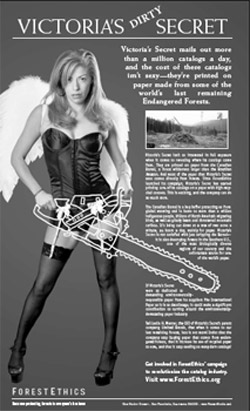Victoria's Got A Secret
Air Date: Week of January 28, 2005
It’s no secret that sex sells, and Victoria’s Secret has built an empire on this maxim with its “barely there” catalogs, one million mailed daily across the nation. Now, an environmental advocacy group is taking the lingerie enterprise to task with a full-page ad featuring a racy model sporting a chainsaw. Guest host Bruce Gellerman talks with Mike Meikson of BCA Marketing Communications about how to sell the environment with sex.
Transcript
GELLERMAN: Sex sells and few companies use sex as succ-sex-fully as Victoria's Secret. The seller of women's intimate wear churns out a million eye-catching catalogs a day.
Now, Forest Ethics, a San Francisco based environmental group, has taken a page out of Victoria's playbook. The group placed a full-page ad in the New York Times featuring a come-hither model sporting a bustier, black stockings, garter belt, spiked heels, angel wings, and a chainsaw.
The ad is designed to draw attention to the forests Victoria's Secret cuts down to produce paper for all those catalogs. Joining me is Mike Meikson creative director for the New York City ad agency BCA Marketing Communications. Welcome, Mike.
MEIKSON: Thanks, Bruce.
GELLERMAN: Provocative ad, huh?
MEIKSON: Yeah, they definitely didn't hold back on the fashion end of this.
GELLERMAN: Does an ad like this work? Is it effective?
|
This full-page ad appeared in The New York Times. MEIKSON: You know, it's a little sad as far as I'm concerned because it's such a good cause and yet the ad, in my opinion, fails on so many different levels to get across the message; despite the provocative lingerie the layout is just really unfortunately done. It's just very confusing when you see it flipping through a newspaper you really don't know what it's about at all. GELLERMAN: So, you think many people might have just looked at this, stopped, said "what's that?" and just kept on going on without reading the content? MEIKSON: Exactly. Exactly. Just looking at this as an ad, I think it's important to imagine it in the context of, you know, a commuter flipping through it on their way to work in the subway. You know, they have a million other things on their mind and to ask somebody to get down to the nuts and bolts and the nitty-gritty of Canadian deforestation, you're really asking way too much of the average person. GELLERMAN: What could have they have done differently? MEIKSON: Well, there's a number of different things they could have done. They could have drawn an analogy between Victoria's Secret and their worship of the female body with - there's kind of a classic link in literature and art between the female body and the Earth. They could have made a number of different comparisons between, you know, "we're trying to keep you beautiful and the Earth beautiful". I mean, obviously, these are just kind of half-baked thoughts, but they could have moved it in that direction. What I would have suggested is figuring out a call to action - some way for the average reader of this ad to get involved. Make that the focus of the ad. Perhaps a petition or some other program designed to encourage companies to reduce paper use. GELLERMAN: You know, advertisers try to get a bounce that is, you know, somebody else, a news organization picking up the story and I read about this, after I saw the ad, in USA Today; we're doing this conversation as a result of the ad… MEIKSON: Uh-huh. Exactly. GELLERMAN: So, does that make for an effective ad? MEIKSON: Well, perhaps. I mean, the PR aspect of it is definitely a good one. The ad itself is no more effective. In fact, I think that they would have gotten even more spin and more PR if they had taken an approach that made them seem more like they were trying to play on the same team as the corporations and effect change in sort of a constructive and positive way rather than looking, in my opinion, sort of like a bunch of wild-eyed radicals. Just looks like a bunch of angry people who are very frustrated, perhaps justifiably so, but aren't so interested in constructive criticism. They just want to get known. GELLERMAN: Angry people in stockings and garter belts. MEIKSON: Indeed. GELLERMAN: Mike, how much would an ad like this cost in the New York Times? A full-page ad? MEIKSON: Somewhere between a hundred and a hundred and fifty grand. It's a lot of money, especially for a non-profit. GELLERMAN: You think it's ironic that they've actually used so much paper to produce this full-page ad in these national newspapers? MEIKSON: You know, I did think about that. But I guess you could make the case and they would probably argue that newspapers, you know, serve a fairly essential function in terms of delivering news and they're subsidized by ads so it's not something that they necessarily want to wipe out. It's this totally egregious delivery of catalogs which, in most cases, as anyone who's been a victim of overflowing mailboxes, is just out of control and probably doesn't accomplish very much for the amount of waste it creates. GELLERMAN: Mike Meikson is Creative Director of the ad agency BCA Marketing Communications in New York City. Michael, good speaking to you. Thank you very much. MEIKSON: No problem. Good to be here. GELLERMAN: Anthony Hebron, a spokesman for Limited Brands, which owns Victoria's Secret, told us the lingerie retailer is working to boost the content of recycled paper in its catalogs from ten to eighty percent. To see the Forest Ethics ad, visit our website - Living on Earth dot org. Victoria's Secret, check your mailbox. [MUSIC: Paul Horn "Altura Do Sol" The Altitude of the Sun (Black*Sun) 1989] Links
|






